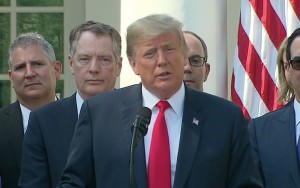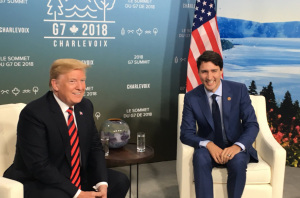
President Donald Trump says the new United States-Mexico-Canada Agreement means plenty of new jobs for U.S. workers.
This story has been updated with new information.
Talking and hand-wringing has shifted to hand shakes and back slapping as renegotiation of the long-standing trade agreement between the United States, Canada and Mexico is finally complete — with significant changes for the auto industry.
The new United States-Mexico-Canada Agreement (USMCA) replaces the $1.2 trillion North American Free Trade Agreement and with it, comes many new jobs, according to its main driver, President Donald Trump. However, the auto industry is taking a wait-and-see attitude.
“These measures will support many – hundreds of thousands – American jobs,” Trump said in remarks at the White House. “It means far more American jobs, and these are high-quality jobs.”
Changing NAFTA was one of Trump’s top campaign promises. He even threatened to simply exit the deal, which he frequently called one of the “worst” deals ever. The talks took significantly longer than initially projected, but now the U.S. expects to sign the new agreement by Nov. 30, then move it along to the U.S. Congress for final approval.
(In rare rebuke, Senate Republicans blast Trump over tariffs. Click Here for the story.)
The U.S. got a lot in the 16-year deal, including a review period after six years, while Trump is promising new jobs, it’s unclear how many of them will come in the automotive sector as many of the new covenants could raise prices on new vehicles — killing sales and, as a result, killing the need for more employees.

Trump admitted his relationship with Canadian Prime Minister Justin Trudeau is strained, but that the pair would be professional in getting a steel deal done.
USMCA raises the U.S.-Mexico-Canada content requirements for new vehicles from 62.5% to 75% to avoid tariffs starting in 2020.
Additionally, the deal mandates that a significant percentage of the work done on the vehicle must be completed by workers earning at least $16 an hour, or about three times what the average Mexican autoworker makes. Starting in 2020, cars and trucks should have at least 30% of the work on the vehicle done by workers earning $16 an hour, rising to 40% by 2023.
Though the deal effectively largely spares Canada and Mexico from the possibility U.S. tariffs on their vehicles, it will make it harder for global auto makers to build cars cheaply in Mexico and makes it basically impossible to build small cars in the U.S.
“At first blush, the USMCA deal appears to be saving the automotive industry some major headaches, but we’re not quite out of the woods yet,” said Ivan Drury, Edmunds’ senior manager of Industry Analysis. “The elimination of a 25% tariff on imported vehicles is a huge win, but the new regional value content requirements mean that automakers will not able to source parts as freely, so there will be added costs associated with vehicle manufacturing.”
“Depending on how high these become there could be setbacks to standard vehicle content or more content could become optional with higher markups. Given that new vehicle prices are already stretched to record highs, things could take an ugly turn for consumer wallets, especially considering the trend of continuously rising interest rates.”
(Click Here for details about why the NAFTA deal faced an uphill battle.)
Automakers offered praise for getting the deal done, but declined to speak specifically about any of the provisions.
“Ford is very encouraged by today’s announcement, and we applaud all three governments for working together to achieve free and fair trade in a strong regional agreement,” said Joe Hinrichs, executive vice president and president of Global Operations.
“We stand ready to be a collaborative partner to ensure this agreement is ratified in all three markets because it will support an integrated, globally competitive automotive business in North America. The benefits of scale and global reach will help to drive volume and support manufacturing jobs.”
General Motors also chimed in with a similar offering.
“General Motors is pleased that the United States, Canada and Mexico have worked together to reach an agreement in principle,” said General Motors in a statement emailed to TheDetroitBureau.com. “This agreement is vital to the success of the North American auto industry; we have long supported efforts to modernize it in a way that strengthens the industry and positions it for long-term success. We appreciate the negotiating parties for engaging the industry stakeholders and look forward to continued collaboration as the agreement is implemented.”
The Alliance of Automobile Manufacturers, a group representing more than a dozen car companies, added, “While we still need to carefully review the text of this proposal, this is an encouraging development. The North American auto industry needs to have all three countries included in the agreement to realize the benefits and goals of a new pact. We have said all along that it is key that the United States, Mexico and Canada maintain this agreement as a trilateral pact.”
Perhaps just as importantly, the new pact does not include any changes to separate U.S. tariffs on steel (25%) and aluminum (10%) levied earlier this year on Canada and Mexico. Trump said the import tariffs would remain in place for Canada and Mexico until they “can do something different like quotas, perhaps.”
(To see more about the U.S., Mexico agreement on NAFTA’s auto provisions, Click Here.)
“We are not going to allow our steel industry to disappear,” Trump said. The talks are on a separate track from the rest of the agreement, according to officials. While there is urgency, there is no timetable for getting those resolved.

“…the $1.2 trillion North American Free Trade Agreement…”. How much is USMCA worth?
At this moment? About $1.2 trillion. MAS.